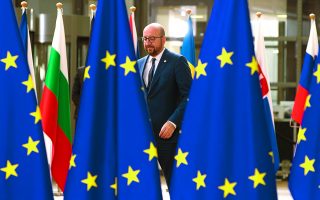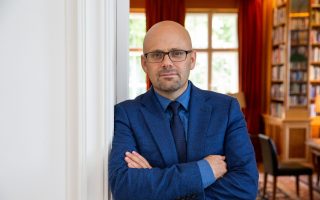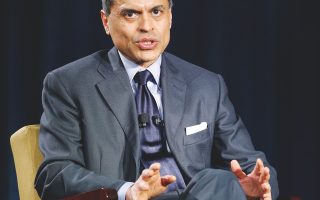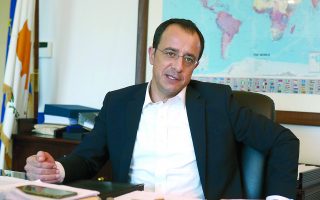Almost halfway into his term, PM looks back and ahead
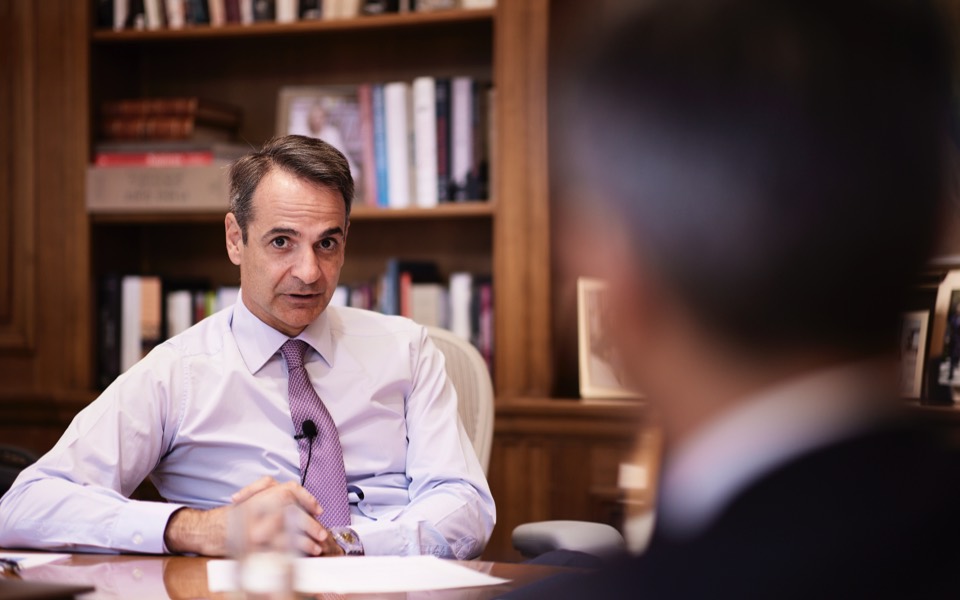
When you first step into the prime minister’s office at the Maximos Mansion in Athens, it feels oddly familiar. The reason is that you’ve seen it time and again in his televised public addresses over the course of the pandemic. In the two years since being elected, Kyriakos Mitsotakis has had to face one major crisis after another, and it is these – Turkey and the pandemic – that we discuss with him in an assessment of the government’s tenure so far and a projection of what lies in the next two years to come.
I would like to take you back to June 8, 2019, the day when you first entered this office. What is your recollection of that day? What was your understanding of the job at the time and how has that perception changed over the past couple of years?
I have to say that this two-year period has been so dense that I too am surprised at how quickly the time passed since the July 7 elections. The joy over winning an election is very short-lived. Immediately after the announcement of the election results, you begin to realize the weight of the responsibility that Greek voters have placed on your shoulders. My first priority on entering the Maximos Mansion was to make sure that we could swiftly organize the structures of the central executive power so as to be able to implement our policy program. I believe that many things over that period went according to plan.
If I asked you to identify one mistake that you could erase from the past, what would that be?
I would go back to the way that we dealt with the second wave of the pandemic originally. We should have imposed restrictions in northern Greece sooner.
Why did that not happen?
It did not happen because no one can be absolutely certain about the data. One must also examine the trends. We were then looking at the beginning of the trend. We said we would wait a bit longer to see if this trend would become more permanent. In hindsight, we should have acted sooner. It’s something I have also said in Parliament. On the other hand, I believe that we learn from our mistakes. That is why we were very prompt in acting ahead of the third wave. If you wait for all the data, then you will be late in making a decision. The problem will overcome you.
We now have a key fact which says that vaccinations can provide a way out of the crisis. And, as far I can see, this is where we are stuck. The inoculation program has hit a wall of hesitancy. If my interpretation of the government’s moves is correct, you are trying to get this moving, to motivate more citizens into getting the shot.
First of all, what you are describing is a global phenomenon. It is not some Greek particularity. I would say that in terms of vaccination willingness, Greece is about average. Now we need to address those who appear to be more distrustful, more skeptical of the need to get vaccinated. And these people do not make up a homogenous group. There are people who reject vaccination on a philosophical basis. It is practically very difficult to convince them about the need to get vaccinated. There is however a large group of people who may be still skeptical; or even some people whose behavior is, in my opinion, extremely reprehensible. It’s the people who say, “Well, I know it works; let other people have it so that the pandemic will be overcome without me having to get the shot.” These people, who are known in English as “free riders,” expect others to do their job for them.
The freeloaders?
Yes, the freeloaders. But freeloading is no more.
The question is, how can you motivate them?
In two ways, I believe. First, we must insist, particularly in respect with older age groups, on hard scientific facts and statistical evidence, which we now have at our disposal regarding the effectiveness of the vaccines. I looked at evidence on the 60 to 80 age group over April, May and June. And it is indeed striking. A total of 2,245 citizens in that age group died over these three months. Only 22 of them were vaccinated. The other 2,223 were unvaccinated. In other words, they were citizens who could have been vaccinated or were able to do so and didn’t. However, let me add this: I cannot force anyone. I cannot make vaccination mandatory. The country will not enter yet another lockdown to protect the small number of unvaccinated and have the large majority of the Greek population, who are vaccinated, pay the price. I believe that vaccinated individuals enjoy rights that are conferred on them [due to their inoculation].
Let’s say that they are no longer deprived of the freedoms that were taken away for public health reasons.
This may be the most appropriate description. This is why we dubbed it “Operation Freedom.” Also, on the issue of the Freedom Pass that we granted to young people, I do not understand those who accuse us of trying to bribe the youth. What would be the benefit of that? Does anyone really think that when elections are held in two years that young voters will still remember that we handed out 150 euros?
The Freedom Pass was one of the things you did. The other is the system whereby businesses in the leisure sector choose whether to cater only to vaccinated customers or a mix of both. Critics have questioned how these measures will be implemented. Do you really believe that the vaccination certificates of people going to a club late at night will be scrutinized?
This all reminds me of something. It reminds me of things we heard with the smoking ban. It happened. I want to remind people of that, because we’ve forgotten. Banning smoking in indoor public spaces was one of my first decisions [as prime minister]. We heard the same thing: “There’s no way it’s going to be enforced.” It was. And this is very easily enforced technologically.
But why the mixed system? Why not a simpler solution, like people who are not immunized are not allowed in indoor leisure venues?
Because no country has done anything like that yet. Because we believe it would be stretching the limits of constitutionality. And because we believe that this is the middle road we have to take right now. People who are not vaccinated must also have the right to entertainment.
Isn’t there a question of fairness, though? Meaning that those who have the option of being vaccinated ignore the risk to society in order to enjoy themselves?
We chose this path, at this point, of the market adapting to this reality. Yes, more freedoms for the vaccinated, but the unvaccinated will also have options, if businesses so desire, to cater to them with stricter occupancy restrictions. If the market’s response is for all businesses to be for the vaccinated, you will achieve the same result but in a way that, in our opinion, is more on more solid constitutional ground.
If I understand what you said earlier correctly, you are ruling out new horizontal measures but not the possibility of a stricter framework, a clearer policy. Is that correct?
Let’s wait and see. I want to stress that this is just one aspect. The other is persuasion. I’ve heard criticism that, apparently, we haven’t carried out a persuasion campaign. Are they serious? It’s all we’ve been talking about for the past 16 months. We have explained how imperative vaccination is, in every possible way, scientific and lay. We have given citizens access to all the public data surrounding what we’re doing. And still people accuse us that we’re not trying to convince citizens? I really wonder sometimes at the quality of public discourse.
There’s only one small party in Parliament that is skeptical.
I can accept an anti-vaxxer, someone who is philosophically opposed to the idea of vaccination, calling the public to protest. What I cannot accept is someone who believes in vaccinations and argues that we must be vaccinated saying that they will take on the risk while also protesting. I find it inconceivable. And this is what happened to the country; it must be said. It was sabotage, sabotage of public health with the sole purpose of political gain – which was not ultimately achieved – by the parties of the opposition, foremost among which was the main opposition. And that is unforgivable in my book. Unforgivable.
Greek-Turkish relations
Let’s talk about the other big crisis of your tenure so far: Greek-Turkish relations. You met with Turkish President Recep Tayyip Erdogan recently. With what degree of certainty would you say that the period of increased tension is over?
I am quite confident that the summer of 2021 will be quieter than the summer of 2020. If you’re asking me whether we have dealt with the structural causes of this tension, then, no, we have not solved our differences with Turkey all of a sudden. What we have done, though, is clearly laid out our positions. We have explained to Turkey that we want a good relationship and that this would be in the interest of both countries and both peoples. If, however, Turkey chooses the path of escalated tension, there will be consequences. We have demonstrated in the field that certain practices are not acceptable. Greece will never allow the weaponization of the refugee crisis and a repeat of the events of last March [2020]. We proved this in the field. We prove it in the field every single day. We built the fence at Evros. We have increased patrols in the Aegean, with absolute respect for human rights. Let me also be clear, though, that the Hellenic Coast Guard is not a refugee and migrant reception service. It is there to guard our borders. And in the event of danger, that anyone is endangered at sea, that person will be rescued, just as we’ve saved thousands of lives at sea.
We have heard accusations – and not just from the opposition here – that the 2020 Evros crisis served as an “alibi” for a more stringent approach, for pushbacks.
I reject the concept of pushbacks, as a term. I reject it. It is word that does not exist in my vocabulary. But when there’s a boat coming, and we see it coming, and we’ve seen where it’s coming from, we have an obligation to alert the Turkish Coast Guard and do what we can so that the boat goes back where it started. This is what we do, and we always do it with the utmost respect for human life.
I have heard you say on numerous occasions that the lines of communication between Athens and Ankara must always be kept open. Do you feel that this is something that has been accomplished on a personal level with President Erdogan?
I believe that I won’t have any difficulty picking up the phone and talking to him.
He has said some very insulting things about you, personally, in public.
OK. I’m overlooking that. The climate [of our meeting] was good.
So there is regular communication?
Of course there’s communication. We talk to everyone. Why would Turkey be the exception? Of course we talk. And if there’s a particular reason, of course I would pick up the phone to talk to Erdogan and I think he would do the same. Just as there are channels of communication at every level, from the exploratory contacts and the confidence building measures, to the relationship of the two [foreign] ministers, Mr [Nikos] Dendias and Mr [Mevlut] Cavusoglu.
Keeping a finger on the pulse
You had said that you would be out and about, getting out of the office, and I cannot recall another prime minister being so present for every initiative and on so many tours.
It’s not just about public relations. I find tours to be the best stimulation, because I hear so much and take in so much. I am also constantly pleasantly surprised. There is clearly a Greece out there that is very creative. It is doing things under the radar. The other day, for example, I was at a school in a small village, in Nikiforo in Drama [northern Greece]. I met a physics teacher there who has created a small observatory and an amazing outdoor exhibition of physical instruments to teach the children experientially. No one told him to do it. He did it in his spare time. And I thought: These are the two worlds. The civil servant who goes above and beyond for his children and the other world which is the unionists who keep reproducing the same stereotypes and do not want evaluations. Let me perfectly clear which side I’m on. I’m with the teacher who is creative.
I imagine you’re referring to the OLME teachers’ union. Its president, though, is a member of your party.
I would like to remind you that there were times, even before I became the head of New Democracy, when I did not get along with certain – and I stress certain – unionists. But unionism is also something that needs to be modernized. It just must. Otherwise, it will deteriorate. Unionists are already discredited and I wonder how they don’t see it.
How do you explain the fact that people from your own party, party officials in fact, are opposing government reforms?
What this proves, after all, is how outdated some of the party stereotypes are, like Left-Right. When a radical leftist party has been able to govern in harmonious cooperation with the populist right, this means that the dividing lines are not so partisan after all, but exist in an entirely different framework. Also, New Democracy of 2021 is not the same as ND of 2016. I have, I believe, made a mark. I have changed the party, as I had vowed to, in terms of people and ideas, so we can embrace the big political and ideological challenges that lie ahead, always with respect for our history.
In the last parliamentary debate, both you and the leader of the main opposition praised US President Joe Biden’s policy line. The leftists also appear to see it as a vindication of their own beliefs. I wonder, do you feel like the pandemic has turned you into a center-leftist?
I am not center-left. I was, I am and I believe I will always be a progressive, liberal, center-right politician.
In terms of the economy, however, you appear to be revising the neoliberal model that has prevailed since the 1980s.
I have never been a neoliberal and my greatest concern right now is that growth, which will come, does not further expand but shrinks the existing disparities. This is my concern. The growth that will come in the years ahead – and I believe it will be strong – cannot be the same as the growth pre-crisis. Firstly, because pre-crisis growth was distorted. It was basically growth with borrowed money. Secondly, because the pandemic, but also climate change, have made the protection and opportunities of our weakest fellow citizens our top political priority. That is what our policies are aimed at.
I will go back to the issue of changes at public schools. Education is and will continue to be, in my opinion, the big conveyor belt of social mobility. Free public education is what will allow a child born into a poor family to eventually lead a better life than his or her parents did. My ideological identity, therefore, is very, very clear. The pandemic certainly made me put much greater weight on certain issues, such as a modern national health system, for example.
That said, nothing has really changed, structurally, in that respect. You have bolstered it materially and with staff, to an extent.
And? Is that negligible?
What I’m asking is whether you have plans for a complete structural overhaul?
Of course, and this is a major opportunity that I will not allow to go to waste. Health is not just about hospitals. It starts with prevention. I repeat. Our non-smoking policy will bring results five or 10 years down the line. We cannot allow Greece to be at the forefront of childhood obesity. Our health policy cannot only be about hiring more people at hospitals. How outmoded is that? There will, of course, be more hirings at hospitals. And we’ve already done that. But that cannot be it. We need to sever the Gordian knot of primary healthcare so that people don’t use hospitals as much. And, yes, the pandemic has shown us that our hospital system is often working at two different speeds. There are cases where we have many more regional hospitals than necessary. We can’t have three hospitals in a radius of 20-30 kilometers – because everyone wanted a hospital in their town – and expect to have three good hospitals. It’s just not possible. This doesn’t mean closing them down, but they can, for example, be transformed into chronic care facilities. But, yes, we will be redrawing the healthcare map.
If I understand correctly, it will basically entail mergers.
The healthcare map will be redrawn. As soon as the pandemic is over, I will be asking an independent committee of experts to give us a comprehensive and honest assessment of what went well and what did not.
In the public eye
You have already said that you see no reason to call early elections, so I won’t ask you again. Do you wonder, though, whether the government’s good performance in public opinion polls may be a trap? That it may cultivate a sense of complacency, or even arrogance?
That is a very good question. I would like to maintain the sense of urgency dictated by the pandemic over the next two years as well. The challenges [that lie ahead], in a sense, are more interesting. We have a recovery fund to manage. We have an economy that is obviously rebounding. We have creative policies, which we can implement to the benefit of the citizens. No, I cannot allow myself any sense of complacency. Sometimes, you need to take a deep breath, take a step away from a good opinion poll and tell yourself that the next one could be much worse. And you need to prepare for that eventuality.
On a different note, your family – your wife and children – are in the media and social media quite a lot. Your son’s personal life recently became a major topic of public conversation. Does that bother you? Is it, as some of your rivals say, a very American style of political marketing?
As far as my wife is concerned, it was others that put her in the crosshairs of political rivalries. She was vulgarly targeted. And I think that we know exactly what happened by now, so those who are being critical should examine their own behavior first. My wife is dynamic. She stopped work because she thought there may be a conflict of interest with her role as the prime minister’s wife. She helps discreetly in a lot of things, which I believe help the country’s image. She is a dynamic woman with a public presence – and I wouldn’t have it any other way.
All three of my children are now adults, and they have chosen to have a social media presence. It’s perfectly understandable that this should cause some interest. But they are incredibly careful and they are not publicity seekers at all. So, what more do you want me to say? Since you ask, I may as well say that certain mechanisms are obviously at work, taking aim even at my son’s private relationship.
A podcast of the full interview, in Greek, is available online at www.kathimerini.gr.
